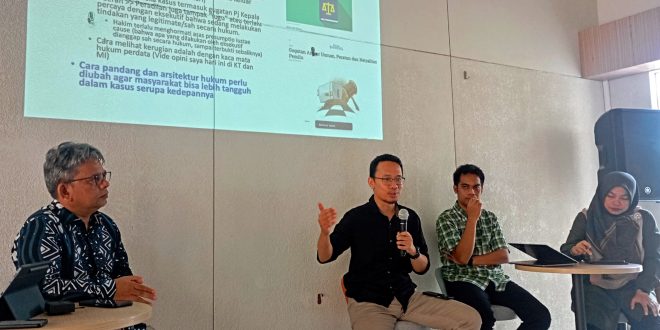The large number of frauds and violations in the 2024 election are considered to be caused by the law being separated from political ethics and morals; this can be seen from the many ethical violations received by election organizers. In fact, ethical violations can become the object of dispute over election results at the Constitutional Court (MK) under the pretext of the organizers’ failure to create an accountable election.
Considering the important role of the Constitutional Court in deciding the 2024 election dispute, Lecturer at the Faculty of Law at the Islamic University of Indonesia (FH UII) Idul Rishan said that the Constitutional Court must pay close attention to the case of Anwar Usman’s ethical violations before passing judgment on the election results dispute (PHPU). According to him, the Constitutional Court must pay attention to the values of honesty in all stages of election contestation and consider conditions of fraud that have escaped the General Election Commission (KPU) and the Election Supervisory Body (Bawaslu).
“For example, if we refer to the previous Constitutional Court decision in disputes over election or regional election results, there is such a thing as a request for disqualification if, for example, it turns out that the KPU and Bawaslu were missed,” said Idul Rishan in a discussion entitled “Election Fraud from the Perspective of the Constitution and State Administrative Law” at the ICW Learning House, South Jakarta (22/2).
Idul believes that the 2024 election problem is very complicated because fraud has occurred since the beginning of the election process. According to him, this has also damaged the credibility of state institutions, which have a role in ensuring the success of elections. He gave the example of the Constitutional Court’s decision to approve Gibran Rakabuming Raka as a vice presidential candidate as well as the KPU’s ethical violation for approving Gibran’s registration as a vice presidential candidate.
“We had an incident where the Constitutional Court passed one of the vice presidential candidates whose decision was wrong. Then the decision of the Constitutional Court panel was also determined, saying that the chief justice of the Constitutional Court was dismissed as chief justice of the Constitutional Court and then deactivated for election cases,” explained Idul.
Professor at the Faculty of Law, Muhammadiyah University of Yogyakarta (UMY), Iwan Satriawan, said that actually changing the constitution four times had provided room for correction in the system. However, he believes that the electoral system is still not perfect, which is due to the poor political culture in Indonesia.
“A good form of political culture is that officials have high ethical standards. As long as we still think that ethics is not a serious problem, I am pessimistic that this country will progress,” said Iwan Satriawan.
Apart from that, Iwan also doubts the resolution of election disputes at the Constitutional Court. Based on his research, the composition of the Constitutional Court judges always tends to legitimize the policies of the government and the People’s Representative Council (DPR). Iwan said that the time for resolving election disputes at the Constitutional Court was very limited; he saw that not changing the 14-day period was part of the initial design of partisanship.
“As citizens, we are not 100% against this stage, but my experience proves that it is not easy,” he stressed.
Iwan emphasized that if the election is carried out with serious constitutional violations, the legitimacy of the election will be low and the government will be ineffective. In fact, effective government determines a democratic process that contains all public interests.
Meanwhile, according to the Head of the UGM Department of State Administrative Law, Richo Andi Wibowo, the abuse of power by the president and ministers to win one of the candidate pairs should be resolved by a lawsuit against the law (PMH) carried out by the government. However, Richo believes that the judicial process is too long, even though it should only take 3-5 days. He also said that if we look at the case of the Acting Regional Head’s lawsuit, the judiciary is too confident in the executive that he is carrying out legally valid actions.
“The perspective and legal architecture need to be changed so that society can be more resilient in similar cases in the future,” said Richo.
University of Indonesia (UI) Faculty of Law lecturer Titi Anggraini believes that elections should highlight various things that are in accordance with the constitution, not just make a fuss about the vote figures. According to Titi, elections as an instrument of democracy must maintain their honor by distancing the election process from efforts to disrupt democracy.
“Numbers can be produced from a process of manipulation, so if we just fall into the trap of thinking that numbers are everything, then we will never get the election process that the constitution requires, namely an election process that is directly public, free of secrets, honest, and fair,” said Titi.
According to Titi, elections are a long process that must be ensured before and after voting. He explained that the constitution requires genuine and periodic elections in one package. Through this, elections are not only interpreted as a five-year ritual.
“So that we don’t just get caught up in elections as a ritual, but elections as a true instrument of democracy,” he stressed. []
 Rumah Pemilu Indonesia Election Portal
Rumah Pemilu Indonesia Election Portal




